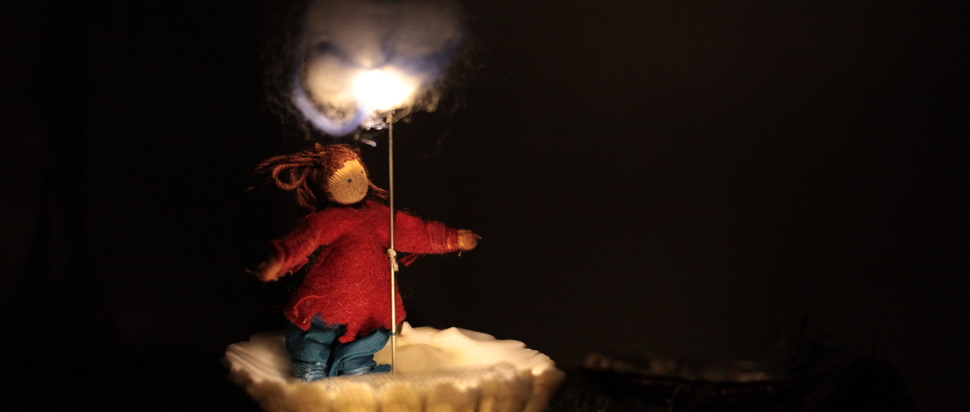Manipulate 2020: Twa Pirate Quines, Dreams of The Small Gods & After Chekov
Puppetry, performance art and pirates: our writers report on three, entirely different stories told at this year's Manipulate
Twa Pirate Quines (★★★★)
Fiona Oliver Larkin’s Twa Pirate Quines is a heart-warming, picturesque piece of theatre, with lashings of insightful design and minimalist puppetry. The story begings with a young woman fishing by the island coastline when a pirate queen, not too dissimilar from herself in appearance, sails into view. A relationship quickly grows between the two women, and the pair dance, sing and align themselves with one another to explore the seas and conquer foes.
The set is made up beautifully to resemble several coral pieces, sea matter and flotsam, and the production utilises soft lighting, shadow puppetry and cut outs to deliver the womens' adventure in a poetic, gorgeously visual style. The ending of Twa Pirate Quines may seem bittersweet to some, but it's a gorgeous finale befitting these characters. Small in scale, Twa Pirate Quines is a charming example of low-key storytelling. [Dominic Corr]
Dreams Of The Small Gods (★★★★)
Making her Manipulate festival debut, Scottish performer, creator and wild circus artist Zinnia Oberski blends performance art, spirituality and aerial circus with her new show. Dreams of the Small Gods explores folk mythology and the transformative states of ‘being.’ Upon entering Summerhall’s Demonstration Room, you’re faced with a transcendental space (part ancient lecture hall, part Ampitheater) and on this occasion, a trapeze dangling eerily above a sacred area of wet dirt. You’re instantly on the verge of darkness, waiting for the event.
Oberski begins the performance hanging upside down, bat-like and faceless under her long hair. We see every muscle stretch and every inhale or exhale of breath as she slowly and animalistically wakes up. Simple but hypnotic, Oberski boldly embraces femininity and immediacy in its most natural, but rarely publicly exposed, state.
A ritualistic and unsettling journey is taken which draws upon Oberski's themes of instinctive exploration and transformation. This ‘wild woman’ moves from an animal in her own territory to a more human being as she discovers the earth around her, before being visited by a skeletal masked creature.
Other-worldly and tense throughout, Dreams of the Small Gods is definitely not for the faint-hearted. Prepare to be wide-eyed and bewildered, but utterly entranced. [Mirren Wilson]
After Chekov (★★)
Don’t panic: you don’t have to be familiar with the Chekovian world to experience this show, despite what its title suggests. After European success, Paris-based puppet company La Compagnie Samolœt showcased their new visual production After Chekhov at Manipulate.
Taking place in a world with no specific time or location, After Chekhov is nonsensical and ominous. Three performers explore and interact with each other within a barren landscape full of shadows, using their imaginations to create their own warmth.
Unfortunately, the imaginations of the creators themselves appear to have been lacking. After Chekhov feels like a clumsy rehearsal: there’s no plot or structure, just a series of visual scenes accompanied by a classical soundscape. It’s all very dreamlike but not dramatically captivating, with no real shift in rhythm or tension. There’s a sense of journeys being made, of separation, of loneliness and sisterhood, with the lines between the present and memory blurred – but there’s no definitive substance to its core, and the result is a kind of hollowness.
To its credit, the entire experience has a rather therapeutic edge. It is somewhat nostalgic over childhood, conveyed through the use of tiny dolls and puppets. The company take pride in the fact that their creative team do everything, from making the puppets and set to performing on stage. It’s stylistically classical, looks very dainty, and verges on being eerie with an underlying but unexplored darkness to the piece.
Despite its flaws, After Chekhov does have some redeeming features, with a certain calming and dreamy charm. [MW]
